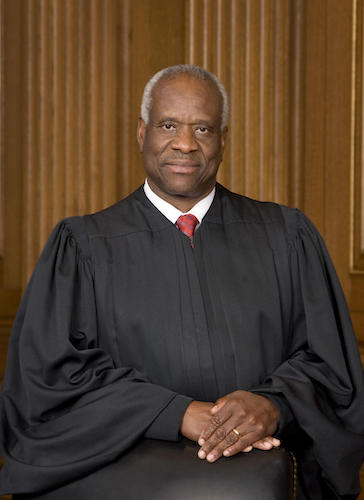
(GA Recorder) — The Georgia Senate passed a bill Tuesday after a contentious debate that would place a statue of Supreme Court Associate Justice Clarence Thomas at the state Capitol.
For the second year in a row, Republican senators sent their House counterparts a proposal to honor the conservative justice with a Capitol monument.
During a floor debate, Democratic lawmakers denounced the Georgia-born Thomas, who grew up in the segregated South and became the second Black justice to serve on the nation’s highest court in 1991. On Tuesday, Thomas was referred to as an “Uncle Tom,” a sellout who used his power to not only to dismantle the rights of Blacks, but also protections for women and gay people.
Republican Rep. Ben Watson, who sponsored Senate Bill 69, said he had a personal connection to Thomas’ mother and he wants to recognize the great achievements of a person whose hometown, Pin Point, lies within his coastal legislative district.
Thomas had to overcome major obstacles at a young age after a house fire left him homeless before moving in with his grandparents in nearby Savannah.
Atlanta Democratic Sen. Emanuel Jones called Thomas an Uncle Tom from the chamber’s floor, a derisive term for a Black person who betrays other Black people.
“When we think about a person in the Black community who’s accomplished, but yet policies seek to subvert, some may even say suppress, the achievements and accomplishments of people of color, I couldn’t help but to think about that term in expressing my dissatisfaction with this particular legislation,” Jones said.
Plans for a Thomas monument advanced through the Senate and a House committee last year but never came up for a vote in the House chamber and so never made it to the governor’s desk.
Funding for the statue would come from private donations. A committee will select the monument’s designers and determine its location either inside the Gold Dome or on the ground where a gallery of Georgians are honored with stone monuments.
In 1991, GOP President George H.W. Bush nominated Thomas to succeed the court’s first Black justice, Thurgood Marshall. Marshall was appointed by President Lyndon B. Johnson in 1967 as the civil rights movement reached a boiling point.
Watson said that Thomas was subjected to supreme court confirmation hearings marred by the worst type of political gamesmanship.
During the hearings, Anita Hill said Thomas had sexually harassed her while she was a lawyer working under his supervision. The controversy surrounding Thomas’ conservative legal positions during the hearings foretold the future as he would go on to be a leading opponent of affirmative action and would help strike down Roe v. Wade in 2022 as one of five justices who halted a constitutional right to abortion.
Thomas has recently called for the court to restrict gay rights and limit married couples’ access to birth control.
Sen. Nikki Merritt, a Grayson Democrat, said Thomas earned strong disdain from many Black people and other minorities, women and the LGTBQ community.
“As a reminder, just as Thomas succeeded, a judicial giant Chief Justice Thurgood Marshall, a fierce litigator for civil rights who was praised for taking a balanced approach to controversial and complicated issues,” Merritt said.
Republicans rejected a criticism that monuments should not be placed until a person is retired or no longer alive in order to avoid the possibility that they might do something to harm their reputation after an honor is cast in stone.
Georgia native and former President Jimmy Carter is the only person honored with a statue at the Capitol who is still alive. One other man, former governor and U.S. Sen. Herman Talmadge, was still alive when a statue of him was erected on the Capitol grounds. Talmadge’s statue now stands in a park across from the Capitol.
Republican Sen. Jason Anavitarte noted that despite Carter’s Republican detractors, he was someone whom both political party factions of Georgia legislators honored with a statue.
“Is it not true that the former president of the United States who is a former great governor of this state, there’s citizens and probably members of this body who took issue with his policies back when he was governor and even president of these United States but we respect that history in this body,” he said.
Thomas’s wife, Ginni Thomas, was also criticized by lawmakers opposing putting up a monument to her husband. After the 2020 presidential election, Ginni Thomas sent text messages to White House chief of staff Mark Meadows pushing for him to support then-President Donald Trump’s attempts to overturn the election, culminating with the insurrection at the U.S. Capitol on Jan. 6, 2021.
“His wife also actively encouraged this coup of violence in an attempt to stop a peaceful transfer of power for the first time in our country’s history,” Merritt said.
Gwinnett County Democratic Sen. Nabilah Islam read out the names of 21 former elected officials and other Confederate leaders who have been recognized with statues and portraits at the Capitol despite dishonoring the nation and fighting against the rights of people of the same color as she said Thomas has.
“If you choose to pass this bill and honor Associate Justice Clarence Thomas in this way, we may make that mistake once more,” she said.
Democratic Sen. Nan Orrock of Atlanta said Tuesday that her attempt last year to get a statue of Ginni Thomas to go up along with one of her husband was made in jest to point out the uncertainty regarding Thomas’ knowledge of his wife’s involvement in the Jan. 6th U.S. Capitol riot.
A brief effort on Tuesday by Democrats to insert a provision in the bill that would include a statue of civil rights activist and former Atlanta Democratic U.S. Rep. John Lewis was withdrawn by Sen. Elena Parent, an Atlanta Democrat.







